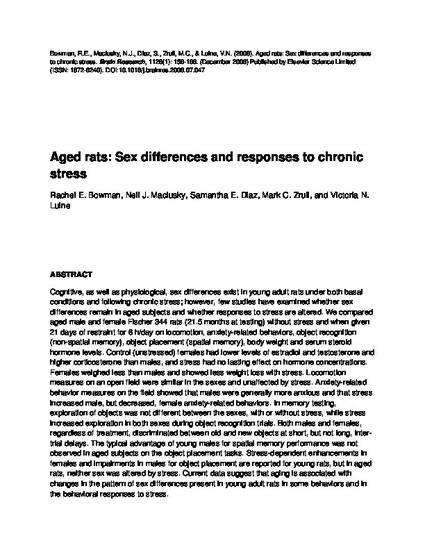
Cognitive, as well as physiological, sex differences exist in young adult rats under both basal conditions and following chronic stress; however, few studies have examined whether sex differences remain in aged subjects and whether responses to stress are altered. We compared aged male and female Fischer 344 rats (21.5 months at testing) without stress and when given 21 days of restraint for 6 h/day on locomotion, anxiety-related behaviors, object recognition (non-spatial memory), object placement (spatial memory), body weight and serum steroid hormone levels. Control (unstressed) females had lower levels of estradiol and testosterone and higher corticosterone than males, and stress had no lasting effect on hormone concentrations. Females weighed less than males and showed less weight loss with stress. Locomotion measures on an open field were similar in the sexes and unaffected by stress. Anxiety-related behavior measures on the field showed that males were generally more anxious and that stress increased male, but decreased, female anxiety-related behaviors. In memory testing, exploration of objects was not different between the sexes, with or without stress, while stress increased exploration in both sexes during object recognition trials. Both males and females, regardless of treatment, discriminated between old and new objects at short, but not long, inter-trial delays. The typical advantage of young males for spatial memory performance was not observed in aged subjects on the object placement tasks. Stress-dependent enhancements in females and impairments in males for object placement are reported for young rats, but in aged rats, neither sex was altered by stress. Current data suggest that aging is associated with changes in the pattern of sex differences present in young adult rats in some behaviors and in the behavioral responses to stress.
Bowman, R. E., Maclusky, N. J., Diaz-Weinstein, S., Zrull, M. C., & Luine, V. N. (2006). Aged rats: Sex differences and responses to chronic stress. Brain Research, 1126(1), 156-166. Doi: 10.1016/j.brainres.2006.07.047

This is a pre-publication author manuscript of the final, published article.